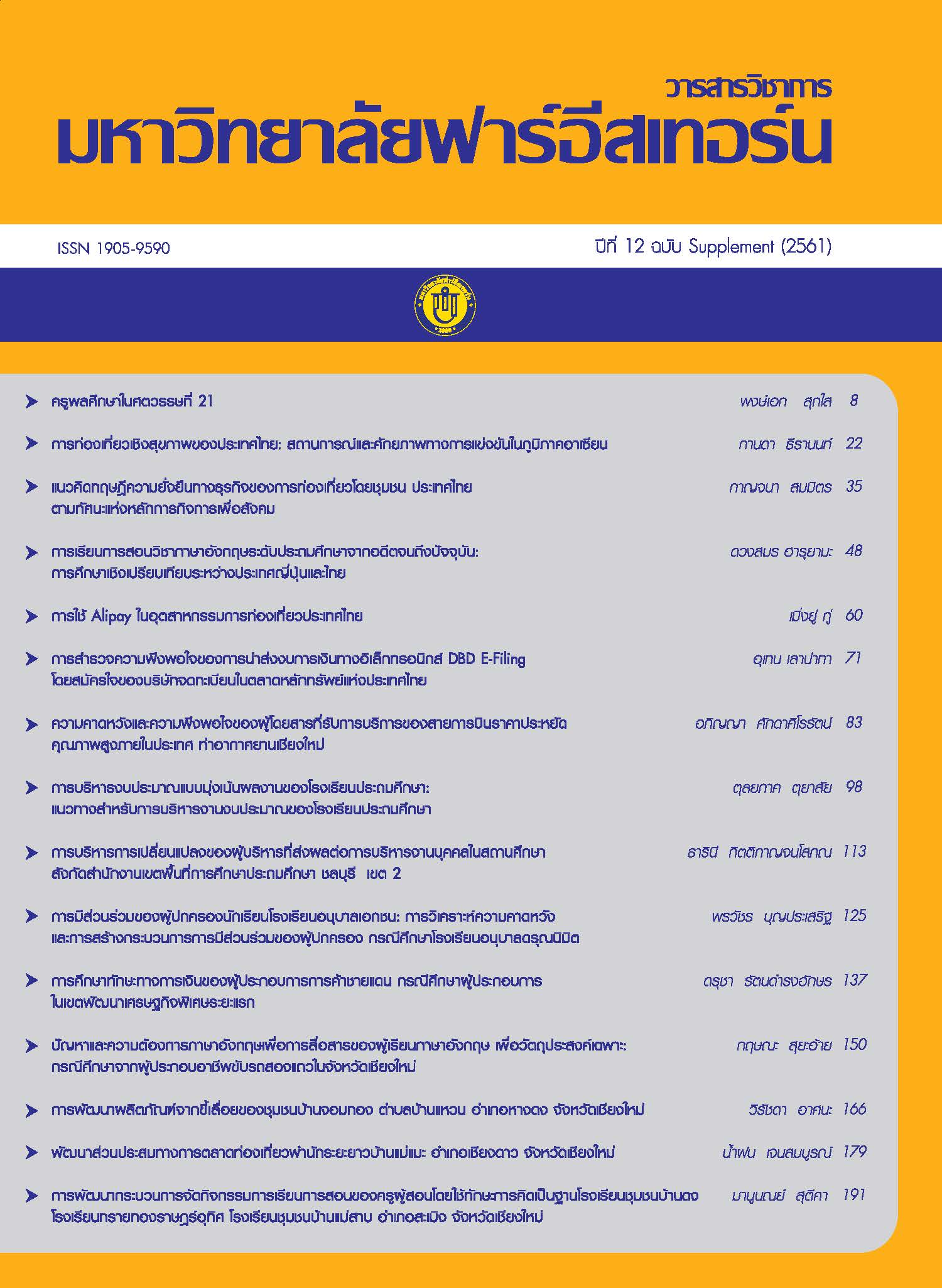English Communication Problems and Needs of ESP Learners: A Case Study of Songthaew Drivers in Chiang Mai
Main Article Content
Abstract
This article is part of research entitled “Development of Self-access Learning Package to Enhance Communicative English Listening and Speaking Skills of Songthaew Drivers in Chiang Mai”. The research objective presented in this article is to investigate the problems and needs of English communication experienced by Songthaew drivers in Chiang Mai. The study employed a survey design to administer observation, interview, and questionnaires to investigate the problems and needs of English communication among 114 Songthaew drivers in Chiang Mai. Besides, the study involved investigating the problems and needs of 10 foreign tourists, who encountered Songthaew drivers on duty. The findings revealed that most Songthaew drivers were not satisfied with their English listening and speaking skills. Listening problems were caused by the accent of the English speakers, the limitation of their vocabulary, the speed of speaking, and lacking English grammar knowledge. English speaking problems, however, were the result of insufficient vocabulary, difficulties with English pronunciation, mispronunciation, and lacking English grammar knowledge. They also reflected that their English language abilities were inadequate for their career path. Furthermore, the result of foreign tourists’ interview showed that problems in English communication of Songthaew drivers were due to inability to communicate in English since the drivers lacked of understanding of English, and they often mispronounced. Based on the findings, the author designed a learning package to serve Songthaew drivers’ problems and needs.
บทความนี้เป็นส่วนหนึ่งของงานวิจัยเรื่อง การพัฒนาชุดสื่อการเรียนรู้ด้วยตนเองเพื่อเพิ่มพูนทักษะการฟังและการพูดภาษาอังกฤษเพื่อการสื่อสารของผู้ประกอบอาชีพขับรถสองแถวในจังหวัดเชียงใหม่ซึ่งวัตถุประสงค์การวิจัยที่นำเสนอในบทความนี้ คือ เพื่อศึกษาสภาพปัญหาและความต้องการในการสื่อสารภาษาอังกฤษของคนขับรถสองแถวในจังหวัดเขียงใหม่ ข้อมูลได้จากการสังเกต สัมภาษณ์ และแบบสอบถามเพื่อศึกษาปัญหาและความต้องการในการสื่อสารภาษาอังกฤษของคนขับรถสองแถวในจังหวัดเชียงใหม่ จำนวน 114 คน นอกจากนี้ผู้เขียนได้สัมภาษณ์นักท่องเที่ยวชาวต่างชาติที่ใช้บริการรถสองแถว จำนวน 10 คน ผลการศึกษาพบว่า คนขับรถสองแถวส่วนใหญ่ไม่พึงพอใจกับทักษะการฟัง การพูดภาษาอังกฤษของตัวเอง โดยปัญหาการฟังเกิดจากสำเนียงผู้พูดข้อจำกัดด้านคำศัพท์ ความเร็วในการพูดและขาดความรู้ด้านไวยากรณ์ ปัญหาด้านการพูดเกิดจากข้อจำกัดด้านคำศัพท์ การออกเสียงภาษาอังกฤษไม่สามารถออกเสียงได้อย่างถูกต้องและขาดความรู้ด้านไวยากรณ์และกลุ่มเป้าหมายคิดว่าความสามารถในการใช้ภาษาอังกฤษของตนไม่เพียงพอต่อการประกอบอาชีพ ส่วนผลการสัมภาษณ์นักท่องเที่ยวชาวต่างชาติที่ใช้บริการรถสองแถว พบว่า ปัญหาการสื่อสารภาษาอังกฤษของคนขับรถสองแถวเกิดจาก คนขับรถไม่สามารถใช้ภาษาอังกฤษในการสื่อสารได้ ไม่เข้าใจภาษาอังกฤษและการออกเสียงไม่ถูกต้อง ผู้เขียนได้นำข้อมูลที่ได้จากการศึกษาไปสร้างชุดสื่อการเรียนเพื่อตอบสนองปัญหาและความต้องการของกลุ่มเป้าหมาย
Article Details
1. Any views and comments in the Journal of Social Innovation and Lifelong Learning are the authors’ views. The editorial staff have not to agree with those views and it is not considered as the editorial’s responsibility.
2. The responsibility of content and draft check of each article belongs to each author. In case, there is any lawsuit about copyright infringement. It is considered as the authors’ sole responsibility.
3. The article copyright belonging to the authors and The Far Eastern University are copyrighted legally. Republication must be received direct permission from the authors and The Far Eastern University in written form.
References
Crystal, David. (2003). The Cambridge Encyclopedia of the English Language. 2nd ed. Cambridge: Cambridge University Press.
Dudley-Evans, T. & St. John, M. J. (1998). Development in English for Specific Purposes: A Multidisciplinary Approach. Cambridge: Cambridge University Press.
Fatihi, A. R. (2003). The Role of Needs Analysis in ESL Program Design. South Asian Language Review. 13, 39-59.
Flick, U. (2002). An introduction to qualitative research (2nd ed.). London: Sage Publications.
Hutchinson, T., &Waters, A. (1987). English for specific purposes: A learning-centered approach. Cambridge: Cambridge University Press.
Jordan, R. R. (1997). English for academic purposes: A guide and resource book for teachers. Cambridge: Cambridge University Press.
Richards, J. (2001). Curriculum Development in Language Teaching. Cambridge: Cambridge University Press.
Richards, J.C., &Schmidt, R.W. (2010). Longman dictionary of language teaching&applied linguistics (4th ed.). Harlow: Longman.
Robinson, P. (1991). ESP Today: a Practitioner’s Guide. UK: Prentice Hall.
Theeb, H., & Albakrawi, M. (2013). Needs analysis of the English language secondary hotel students in Jordan. International Journal of English Language Teaching. 1(1), 13-23.

